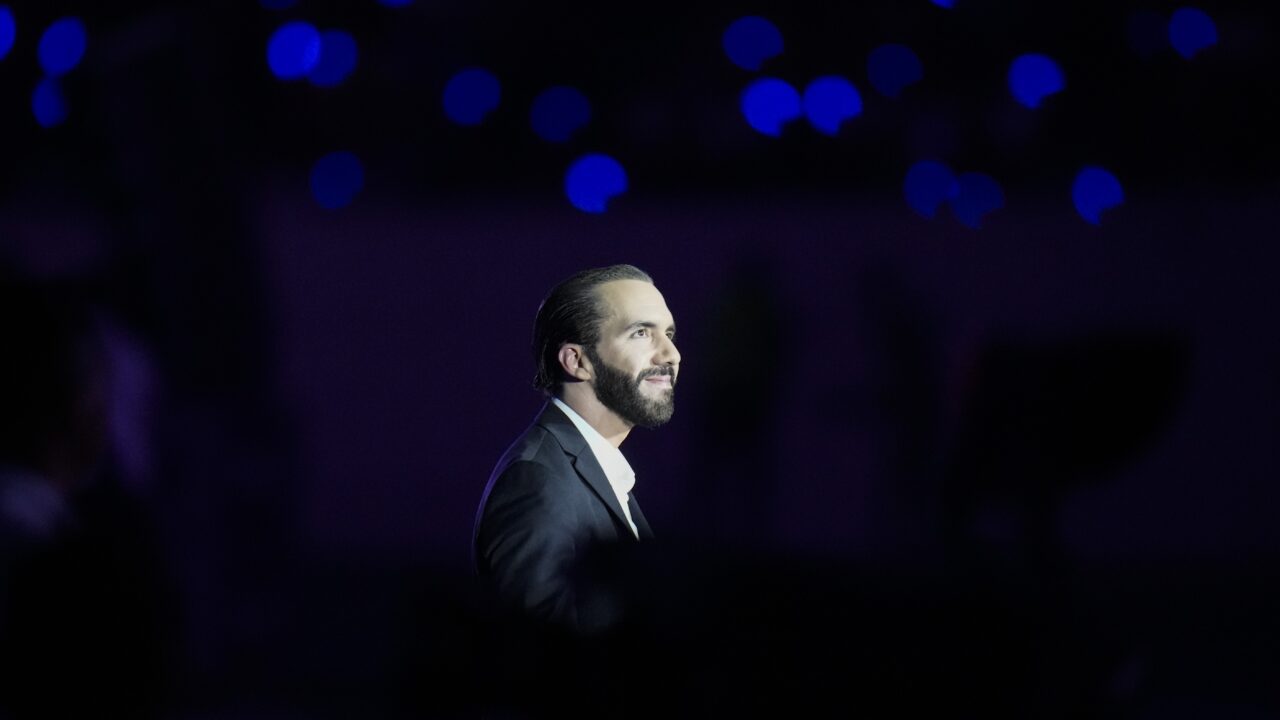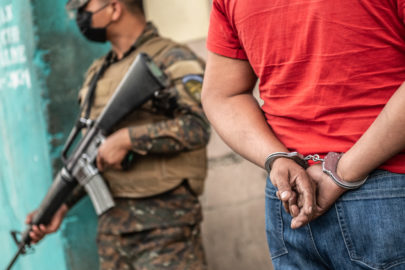Free Speech Under Fire in Bukele’s El Salvador
President Nayib Bukele’s slide toward authoritarianism has culminated in an unconstitutional reelection bid. His consolidation of power has cracked down on independent press. Salvadoran President Nayib Bukele is illuminated by a stage spotlight during the Central American and Caribbean Games opening ceremony in San Salvador, El Salvador, June 23, 2023. (AP Photo/Arnulfo Franco)
Salvadoran President Nayib Bukele is illuminated by a stage spotlight during the Central American and Caribbean Games opening ceremony in San Salvador, El Salvador, June 23, 2023. (AP Photo/Arnulfo Franco)
Editor’s Note: President Nayib Bukele has now claimed victory in El Salvador’s election.
Nelson Rauda Zablah tries not to think of the future too much. “Because if I do,” he says, “I can’t sleep.” The 32-year-old journalist writes for El Faro, El Salvador’s most well-known online independent media outlet, and also contributes to international publications. We met in early January 2024 at a non-descript coffee shop in one of San Salvador’s numerous strip malls. Rauda’s writings and videos have explained, among other topics, Bitcoin’s inglorious path in El Salvador. In a January 2024 article for the Christian Science Monitor about President Nayib Bukele’s unconstitutional reelection campaign “Breaking the law – in a popular way?” he sums up the country’s confusing political landscape. Although nearly half the population think Bukele’s reelection bid breaks the law, Rauda writes, “a majority say they’ll vote for him.”
Bukele, a populist strongman who has systematically undone El Salvador’s fragile democracy since he was elected in 2019, is clearly barred from running for reelection under multiple articles of the Salvadoran constitution. Yet the Supreme Court—stacked with judges appointed by Bukele’s allies—cleared the way for his run. The president has crafted a concoction of justifications for the move, from citing a hidden article in the constitution that supposedly allows reelection, to staging a leave of absence from the presidency that he argues circumvents the no-consecutive-term rule. Bukele is determined to stay in power.
In a Trumpian parallel, Bukele has persistently lashed out at independent media, labeling them “fake news.” El Faro, as an independent organization unwilling to serve as a mouthpiece for the government, has been a consistent target. The discovery that Pegasus spyware had been placed on multiple El Faro journalists’ phones led to a major lawsuit and showed the extent Salvadoran actors would go to intervene in the freedom of the press. In February 2022, El Salvador’s Legislative Assembly approved a penal code reform that legitimized digital spying, all part of Bukele’s consolidation of power. Some Salvadoran journalists have fled the country.
As Rauda’s reporting shows, Bukele is expected to sweep the February 4 presidential election. With sky-high approval ratings since he declared a state of emergency in March 2022, Bukele’s lock ‘em up approach to gangs has resonated with Salvadorans exhausted from relentless violence over the last half-century. From the civil war to gang domination of many communities, collective trauma has become a political commodity in elections.
Reelection videos posted on the president’s social media platforms and making the rounds in traditional media provide emotional testimonies as to why average Salvadorans affected by gang violence stand with Bukele to say “Nunca Más”—Never Again. Coming on the heels of his state of exception tactic to break gang control by suspending constitutional rights, the media campaign appears to have been effective. Sixty-six out of every hundred Salvadorans have strong faith in the president, according to a December 2023 poll by the Instituto Universitario de Opinión Pública (IUDOP).
Rauda points out that the government’s media campaign is taking place in the context of “a very low level of information comprehension.” Despite ample reports of the consequences of his slide toward authoritarianism, including widespread arbitrary detention and human rights abuses under the state of exception, voter opinions of Bukele have remained positive. “The government propaganda machine has all the radio and TV news outlets, YouTubers, TikTokers, influencers, and trolls at their disposal,” Rauda says. “How can independent journalism compete with that?”
Bukele’s El Salvador: A Dictatorship?
Following Bukele’s “technical coup d’etat” on May 1, 2021, when the newly elected legislators of his Nuevas Ideas party replaced Supreme Court magistrates with party loyalists in a process that bucked legal protocol, El Faro’s editorial board first used the term “dictatorship” for the Salvadoran regime. They followed up with an editorial in September 2021 titled “Bukele Announces a Dictatorship” when he unveiled his intention to run for reelection despite the constitutional bar for current presidents to do so. Their team has also covered the small but potent social movements that are pushing back.
Despite ample reports of the consequences of his slide toward authoritarianism, including widespread arbitrary detention and human rights abuses under the state of exception, voter opinions of Bukele have remained positive.
In the leadup to the February 2024 election, Rauda’s reporting has looked in-depth at the political hoop-jumping politicians have been going through to try to justify Bukele’s intentions to run again. El Faro journalists, Rauda writes, poured through “the hundreds of pages of the sessions debating and approving the 1983 draft constitution, hours of recorded sessions, and contemporary newspapers” and also consulted with constitutional experts. This kind of investigative rigor has translated into some of the most cutting-edge journalism happening in the region. But it has not changed the public tide.
Rauda understands why. With dramatically reduced gang violence, many people are feeling safer much of the time. But it’s a false sense of security. “El Salvador is becoming a police state with no guarantees. It is also providing security with no guarantees,” he says. “It’s like, you are ok up to a point. But if someone screws with you, denounces you, or arrests you, there is nothing you can do. It is super dangerous right now, because people can be captured for anything.”
From the United States, there has been significant resistance to removing the label of democracy from El Salvador. Given the country’s hard-won consolidation of democracy with the change of presidential power in 2009 from ARENA to the FMLN—the first transfer between political parties since the end of the civil war—not to mention the millions of dollars in foreign aid for democracy-promotion, the United States is reluctant to admit failure. This in part may be because doing so would concede that no amount of aid money could absolve the United States for using El Salvador as a proxy in the Cold War, when it undercut a likely FMLN victory through military support to the dictatorship in its attempt to defeat a USSR-supported guerrilla movement. However, denying that El Salvador is currently a dictatorship does a disservice to Salvadorans currently living without the benefits a democratic regime provides, as well as to those being deported back to the country by the United States.
Protecting the Right to Speak
In the face of extensive government persecution, including the targeting of its journalists with Pegasus spyware, El Faro’s relocated its headquarters to Costa Rica last year. Sergio Arauz, El Faro’s curly-haired deputy editor-in-chief and a leader in the Asociación de Periodistas de El Salvador (APES), tells me that APES has made a crisis manual and a legal assistance clinic for journalists. APES has already accompanied some of its members as they have navigated family members being incarcerated.
“There are many risks for journalists,” Arauz says. “The problem is that the government is repressive. Under the regime, there is a certain calm. But Bukele maintains control of what can be expressed and how.” When asked how Arauz determines if El Salvador merits the label of democracy, he enumerates a series of undemocratic actions that Bukele has taken since 2019, including attacks on the press and transparency and culminating in the state of exception and unconstitutional reelection bid. Rather than a “textbook dictator,” however, Arauz sees Bukele as a “millennial dictator, who is very popular” due to the “tangible benefits [people] see in their lives.”
Multiple people I spoke with commented that in some ways, Bukele is a logical demigod created by the failure of the left—the FMLN—to fulfill its promises when it controlled the presidency from 2009 to 2019. The hopes of many working-class people in both rural and urban settings hinged on the FMLN addressing the material insecurity in their lives. When that didn’t happen, Bukelismo became a compelling alternative.
Bukelismo, Safety, and Self-censorship
Arauz is clear-eyed about where things stand. “We didn’t have the right to free movement during the pandemic, and we didn’t have the rights to security with gang control. It is a state without rights, and we live in the shadow of this reality.”
“Under the regime, there is a certain calm. But Bukele maintains control of what can be expressed and how.”
Bukele’s ability to carry out his promise rests on maintaining public safety—contingent on keeping gangs unable to govern, and curbing the police, military, and narco violence. But multiple people pointed out to me that the main gang leaders were able to leave the country, in some cases aided by Bukele’s government. The increased security many people in El Salvador are experiencing under the state of exception is predicated on a false promise that the gangs, weakened at the moment, won’t come back. It also doesn’t account for the increase in violence from state actors, including police, military personnel, the judiciary, and penal system staff. But since such violence is not evenly distributed across the population, it hasn’t yet undercut Bukele’s popularity.
Numerous people in civil society that I interviewed commented that they were choosing to stay silent about human rights violations for their own protection and that of their families. They felt the risk of speaking out was too great, as they had seen other people arbitrarily denounced for less. Whereas under gang control Salvadorans had a mandate to “see, hear, and shut up,” multiple interviewees commented they were staying silent to stay safe under the regime. “One has to be careful in what one says to people in general,” Arauz says. “If people could really say what they feel, we might hear different things.”
Though El Salvador’s independent journalists are forthcoming in their political analyses, they recognize that the majority of their compatriots are self-censoring for self-protection. While many of those who most understand the role of democracy are the least willing to voice it, those who appreciate the short-term gains under Bukele are set to sweep him back into office on February 4. “The validity of democracy is hard in this country,” Arauz comments, “because it doesn’t solve the main problems that people face in their daily lives: economy and security. It is hard to explain to people that at the base of an economy are rights. Journalists try our best to explain it.”
Your support is crucial…With an uncertain future and a new administration casting doubt on press freedoms, the danger is clear: The truth is at risk.
Now is the time to give. Your tax-deductible support allows us to dig deeper, delivering fearless investigative reporting and analysis that exposes what’s really happening — without compromise.
Stand with our courageous journalists. Donate today to protect a free press, uphold democracy and unearth untold stories.




You need to be a supporter to comment.
There are currently no responses to this article.
Be the first to respond.